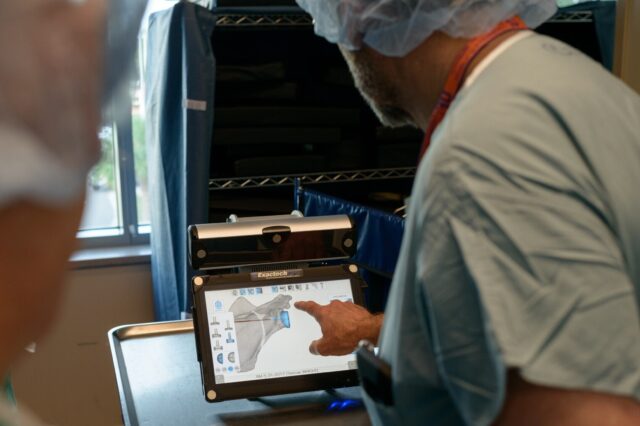UF Health physician on leading-edge of shoulder surgery technique

Sometimes the eyes have it. But for a surgeon, a little X-ray vision never hurts.
The doctor might see exactly how deeply a drill bit cuts into bone during a complicated joint replacement. Or perhaps the surgeon could avoid cutting a painful nerve that would otherwise be obscured.
X-ray vision isn’t literally true, of course. But medical technology can sometimes hint at our comic book fantasies.
A University of Florida Health orthopaedic surgeon is one of two doctors to perform the first computer-assisted shoulder replacement surgery in the U.S., using a new technology enabling live navigation of the operative site.
ExactechGPS Total Shoulder Application provides the surgeon with a real-time 3D computer model of a patient’s shoulder during surgery. It does this by combining CT scan images with data from instruments mounted with tiny infrared cameras.
The combination gives the surgeon a road map for the placement of implant screws with tolerances of 2 millimeters, besting what is possible with the human eye. The technology is expected to produce more secure, durable implants with fewer complications.
Thomas Wright, M.D., a UF professor and surgeon with the UF Health Orthopaedics and Sports Medicine Institute, and the director of the Interdisciplinary Center for Musculoskeletal Training and Research, performed the surgery May 31, 2017. He was assisted by Larry D. Waldrop, M.D.
Wright’s surgery was done simultaneously with an identical procedure performed on a second patient by Richard Jones, M.D., of Pardee UNC Healthcare’s Southeastern Sports Medicine & Orthopedics in Hendersonville, N.C. Since both Wright and Jones worked on the design of the technology with Exactech, a Gainesville medical device manufacturer, they decided to share the honor of being the first in the U.S. to use the technology.
“This dramatically improves accuracy,” said Wright. “It certainly allows you to place things exactly where you want to place them. I think we’re probably good with the human eye to 3 to 5 millimeters. And that’s for surgeons who do a lot of these procedures. But even that is not nearly as good as this technology. This thing would kill me every time. It’d be like playing against a chess champion.”
Mercia Reid doesn’t mind having the chess champion in her corner. So she agreed to allow the use of the technology during her surgery.
Reid, 74, a retired home care aide, has severe arthritis. Wright had already performed a successful shoulder replacement on her left shoulder before deciding surgery was necessary on the right shoulder, too.
“So far, it’s been good,” the Gainesville resident said of her recovery a week after the surgery. “I have to keep reminding myself to keep my arm down and not use my hand. It’s been feeling good.”
During Reid’s surgery, Wright and Waldrop carefully positioned a drill as they checked a computer tablet screen with a digital crosshairs showing the surgeon’s planned drill placement on the bone. As they moved the drill, a dot moved toward the target. When the green dot aligned with the crosshairs, the surgical team had a far more precise drilling point than can be done with the human eye.
For someone like Wright, that difference might be small. But he said Exactech’s technology will enable surgeons who typically perform fewer of these operations to place bone screws far closer to the mark.
“The outcome for low-volume surgeons is not predictable, whereas ours are much tighter because we do four to 10 a week,” Wright said.
Along with a better-functioning shoulder, patients get something else after surgery: A copy of the digital recording of their procedure.
About the author
